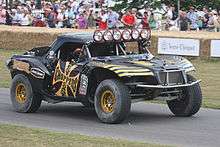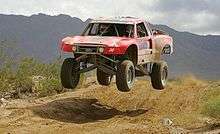Trophy truck
A trophy truck, also known as a Baja truck or trick truck, is a vehicle used in high-speed off-road racing. This is an open production class and all components are considered legal unless specifically restricted.

Although any truck that meets the safety standards can race the trophy truck class, they, for the most part, feature long travel suspensions and high power engines. They are intended for desert racing only, and are not street legal. These vehicles are properly known as "trophy trucks" when raced in SCORE International sanctioned races,[1] and "trick trucks" when raced in Best in the Desert sanctioned races.[2]
Since the class was introduced in 1994, the development of the trophy truck has been rapid. Prior to that date, SCORE's Class-8 rules dictated that the entrants must use a production frame.[3] The introduction of the trophy truck class brought with it new freedom for competitors with minimal rules in its construction. Intense development in full-tube chassis and suspension travel led to previously unseen performance and speed.
History
With no proven formula, the initial trophy truck designs were very varied, usually with no two trucks the same. Over a development process of ten years, eventually engineering firms like Geiser Brothers,[4] Jimco,[5] Racer Engineering,[6] and ID Designs[7] became known for producing successful trucks. In recent years new truck builders such as TSCO Racing,[8] and Mason Motorsports Inc.,[9] have produced very advanced machines with many top racers seeing successful finishing results.
Truck design

Trophy trucks have been traditionally two-wheel drive but recent developments have seen more than one truck builder implementing all-wheel drive equipment. Most feature a 4130 chromoly steel tube-frame chassis covered by an aerodynamically engineered composite body. All trucks are equipped with a steel tube roll cage. The SCORE International Rule Book[10] defines and specifies the trophy truck requirements.
Gasoline engines are naturally aspirated, and typically Ford or Chevrolet V8 engines, generating in excess of 850-900 BHP (630-670 kW) and 900lb-foot (1200 N-m) of torque. Turbo charged diesel motors are allowed, with a minimum size of 5.0 liters to a maximum size of 6.6 liters, with two turbo chargers. Turbo engines must be fitted with an air restrictor.
Suspension travel is around 24 inches (61 cm) of wheel travel in the front and 36 inches (91 cm) of travel in the rear, although this may vary depending on chassis design. Most trophy trucks use independent A-arm suspensions up front. In the rear, most trucks feature a three or four-link setup with a solid rear axle, while some use various types of independent suspension. Suspension and damping duties are handled by one or two shock absorbers per wheel, usually consisting of one coil-over and one by-pass shock.[11] Fox Racing Shox,[12] Bilstein,[13] and King Shocks[14] are popular among competitors.
Tires are typically 39 inches (99 cm) tall or larger on 17-inch (43 cm) lightweight alloy wheels. Trophy trucks usually carry two spare tires in case of puncture. Total wet weight is around 3,500 pounds (1,600 kg) minimum, with the mass necessary to absorb the rougher terrain in desert racing.
Transmission is a choice of either three-speed automatic or six-speed sequential gearbox. The three-speed TH400 gearbox[15] predates the Baja 1000 but remains popular among competitors due to the long gear ratios and capability of handling the torque spikes caused by off-road racing. The six-speed sequential gearbox appeals to competitors due to the ease of changing gear ratios quickly.
The development of lights has allowed competitors to switch from High-intensity discharge lamps to a viable LED technology. Rigid Industries[16] was the first LED company to win the Baja 1000 in 2012 with BJ Baldwin. LED light bars are lighter & smaller, creating less drag and better aerodynamics. The tougher housing and lack of filament make them much more robust.
See also
| Wikimedia Commons has media related to Trophy Trucks. |
- Short course off road racing, a form of off-road racing using vehicles similar to trophy trucks
- Off-road racing
- Desert racing
- Beach racing
- Pickup truck racing
- Truck racing
- Monster truck
References
- "SCORE OFF-ROAD RACING – SCORE-International.com". score-international.com. Retrieved 2015-12-28.
- "THR Motorsports Parker "250" presented by Polaris - Best in the Desert". Best in the Desert. Retrieved 2015-12-28.
- SCORE International Off-Road Racing Rules and Regulations 2011-2015.
- "Home | Geiser Bros | design & development". geiserbros.com. Retrieved 2015-12-28.
- "Jimco Racing builds championship off road race cars". www.jimcorace.com. Retrieved 2015-12-28.
- "racerengineering.com". www.racerengineering.com. Retrieved 2015-12-28.
- "ID Designs".
- "Home | TSCO Racing |". Retrieved 2019-06-06.
- "Home | Mason Motorsports |". Retrieved 2019-06-06.
- "Rule Book". www.score-international.com/accessdate = 2019-06-06.
- Brenthel Industries brenthelindustries.com Archived 2010-11-23 at the Wayback Machine
- "Fox Racing - Foxhead.com". www.foxhead.com. Retrieved 2015-12-28.
- "BILSTEIN COM". www.bilstein.com. Retrieved 2015-12-28.
- "King Off-Road Racing Shocks: Coil Overs, Bypass, OEM, UTV, Air Shocks, Bump Stops, Springs, Replacement Parts, Tools, Springs « King Off-Road Racing Shocks : kingshocks.com". www.kingshocks.com. Retrieved 2015-12-28.
- "The Novak Guide to the GM TH400 Automatic Transmission". www.novak-adapt.com. Retrieved 2015-12-28.
- "Rigid Industries LED Lighting | LED Lights, Offroad, Marine, Truck". www.rigidindustries.com. Retrieved 2015-12-28.